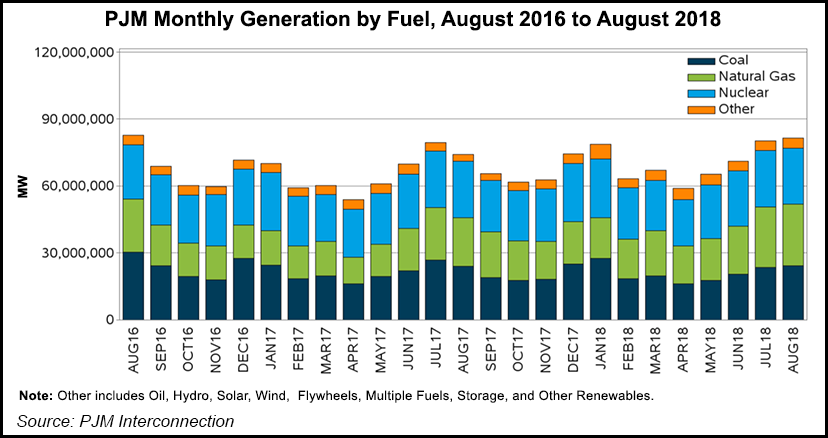Regulatory | Infrastructure | NGI All News Access
PJM CEO Touts Fuel Security Study Due Out Nov. 1
Questions about fuel security during potential emergency situations are legitimate, but any federal government action to prop up coal-fired or nuclear generation should wait at least until the results of an ongoing PJM Interconnection analysis of the issue become available, according to the grid operator’s CEO Andrew Ott.

“As we get more and more dependent upon natural gas resources and see the retirement of coal and nuclear, the question is being asked, ‘are we vulnerable?’ and I think it’s an absolutely valid question,” Ott said during a hearing of the Senate Energy and Natural Resources Committee Thursday. “We’re taking that on.”
“On Nov. 1, PJM will issue a fuel security study looking out into 2023, to say ‘are we vulnerable? What are the pinch points?’ It’s an analytical approach.”
Ott was on a six-member panel called to discuss blackstart, the process for returning energy to the power grid after system-wide blackouts, and other system restoration plans for the electric utility industry. Some senators, including Joe Manchin (D-WV), said they were concerned about the effect retiring coal and nuclear generation could have on blackstart plans in the event of a national emergency.
“If this all comes down and these retirements go into an accelerated rate, I continually believe that the grid is going to be jeopardized, that the security of our nation is going to be jeopardized,” Manchin said
But with such retirements in PJM not scheduled until 2021 and 2022, the grid operator will have time to address any resilience or reliability issues uncovered by the fuel security study, according to Ott.
“Instead of the federal government stepping in, allow us to complete our analysis in the time given,” he said.
PJM began an analysis in May of long-term fuel security as part of an effort to ensure that the nation’s largest grid remains reliable and resilient to the broader changes underway in wholesale power markets. The study is scheduled to be released Nov. 1, Ott said.
A report released by the grid operator last year found that its system was not becoming too reliant on natural gas and renewable resources, even as more baseload coal-fired facilities retire and nuclear plants are threatened by low-cost natural gas.
However, the report also acknowledged that “heavy reliance on one resource type” posed risks and suggested, for example, that the potential of increased dependency on pipelines warranted further study.
In January, FERC unanimously rejected a controversial notice of proposed rulemaking by Department of Energy (DOE) Secretary Rick Perry to change the nation’s grid reliability and resilience policies — a proposal widely seen as favoring coal and nuclear generation at the expense of natural gas — and instead issued a separate order “to holistically examine the resilience of the bulk power system” [AD18-7].
The White House has hinted that President Trump might issue an executive order requiring grid operators to buy electricity from “critical” coal and nuclear plants. In August, Federal Energy Regulatory Commission Chief of Staff Anthony Pugliese discussed efforts by FERC to identify such plants at a meeting of the American Nuclear Society.
That kind of executive action would be “very inefficient,” Ott said Thursday, according to published reports.
Any major actions through the four-person FERC would be difficult at this point with the two Republican and two Democratic Commissioners likely to emerge with a tie vote on any controversial issue.
Ott’s comments came as FERC awaits confirmation of a fifth commissioner.
Trump nominated Republican Bernard McNamee earlier this month with an eye to breaking the tie. The confirmation process appeared to be on a fast track when the committee promptly scheduled a hearing for next Tuesday (Oct. 16) for McNamee. But those plans hit a speed bump Thursday, when the Senate agreed to a recess due to last until after the midterm election, forcing the committee to reschedule the hearing to Nov. 15 in the after-election lame duck time frame
Nearly five months passed between the day Trump announced his intent to nominate Republican Kevin McIntyre and his swearing in as FERC Chairman last year.
If confirmed, McNamee would fill a spot previously held by Robert Powelson, for the remainder of a five-year term due to expire June 30, 2020.
McNamee would be the third Republican at FERC, joining McIntyre and Neil Chatterjee. Richard Glick and Cheryl LaFleur are Democrats and have dissented on several recent votes.
© 2024 Natural Gas Intelligence. All rights reserved.
ISSN © 1532-1231 | ISSN © 2577-9877 |
